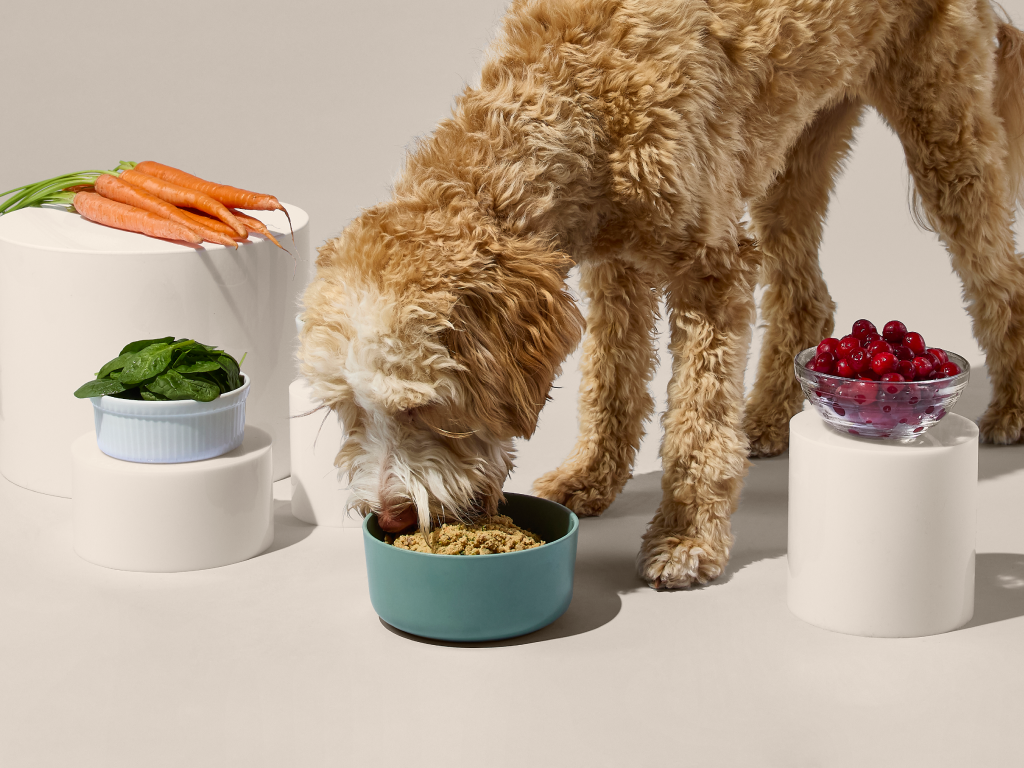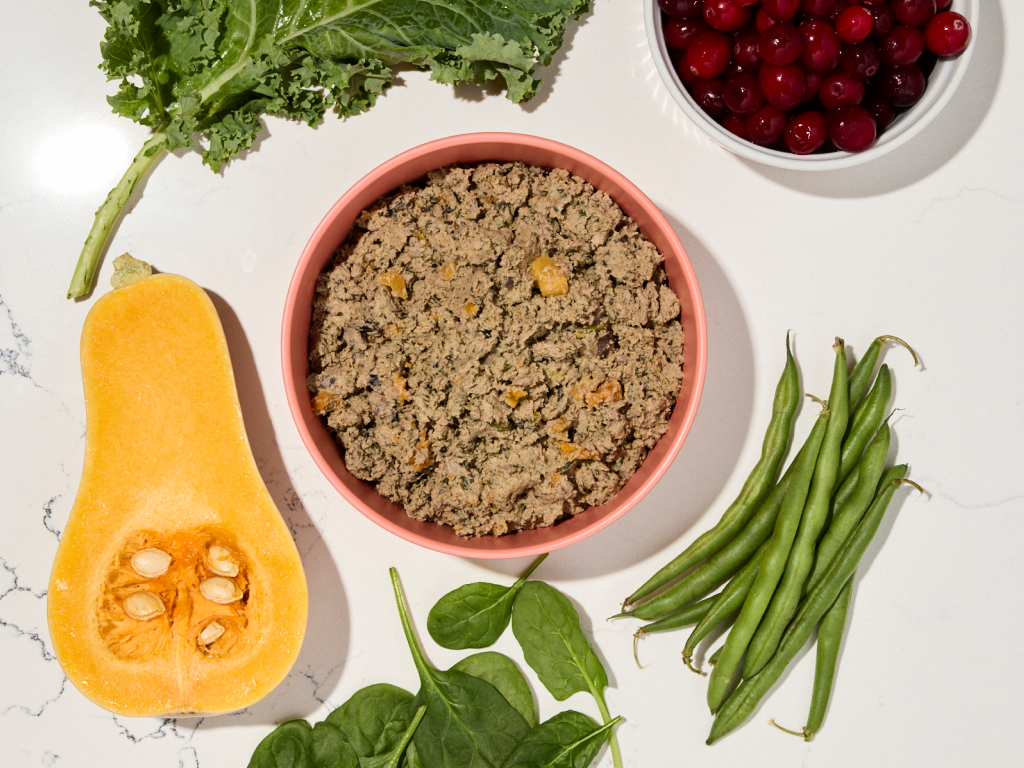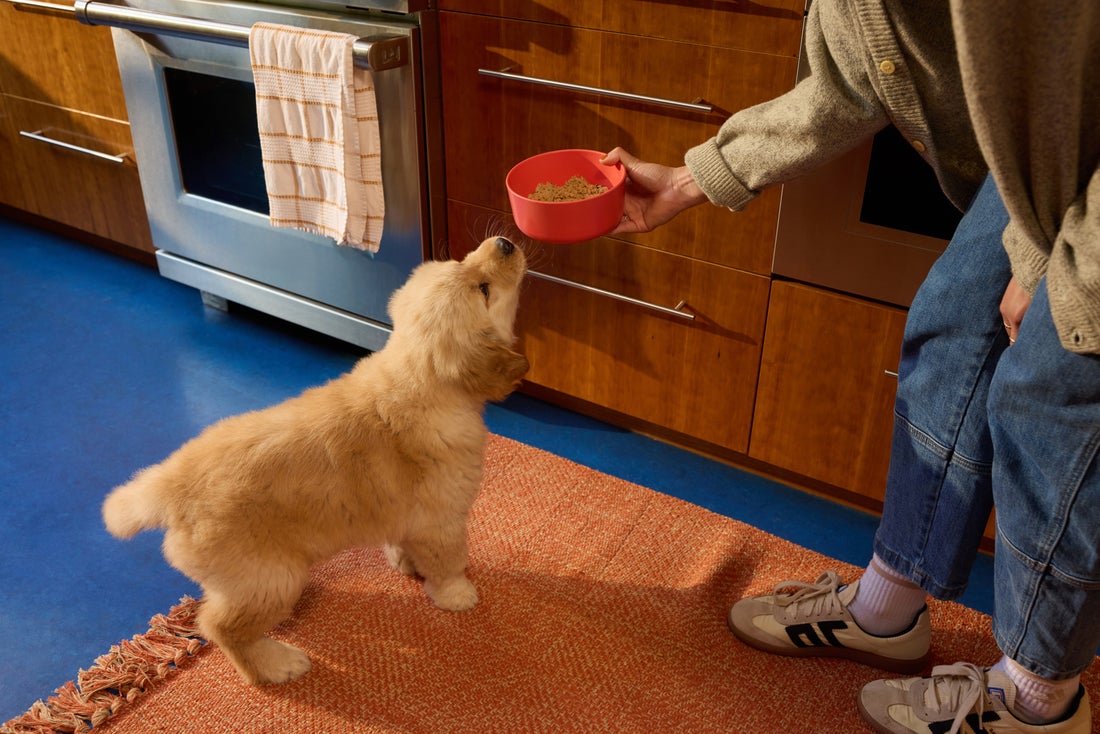Hey Ollie blog readers! We’re offering you an exclusive 60% OFF your starter box! Try now!
Watching your dog struggle with an upset stomach, diarrhea, or gas is difficult for any pet parent. Digestive issues are common, but the good news is that the right nutrition can make a world of difference. Finding the best dog food for a sensitive stomach is key to managing symptoms and helping your pup feel their best.
We have the scoop on how to support your dog’s gastrointestinal (GI) health, from identifying symptoms to choosing the right ingredients. By understanding the source of your dog’s discomfort, you can provide targeted support for their digestive system.
While this article offers advice, it is not a substitute for a veterinary diagnosis. Always consult your veterinarian before making any changes to your dog’s diet.
Does My Dog Have a Sensitive Stomach?
“Sensitive stomach” isn’t a formal medical diagnosis, but it’s a useful way to describe general digestive distress. While some signs like vomiting and diarrhea are obvious, others can be more subtle. If you notice any of the following symptoms, your dog may be experiencing digestive issues:
- Loss of appetite
- Excessive gas or bloating
- Lethargy or decreased activity
- Loud gurgling noises from the abdomen
- Frequent belching or hiccups
- Signs of abdominal pain (e.g., an arched back or frequent stretching)
- Soft, loose, or abnormally colored stool
- Constipation
Persistent GI issues can lead to serious health consequences like dehydration and may signal an underlying condition such as inflammatory bowel disease or an intestinal blockage. If your dog experiences these signs frequently, it’s important to seek prompt veterinary care.
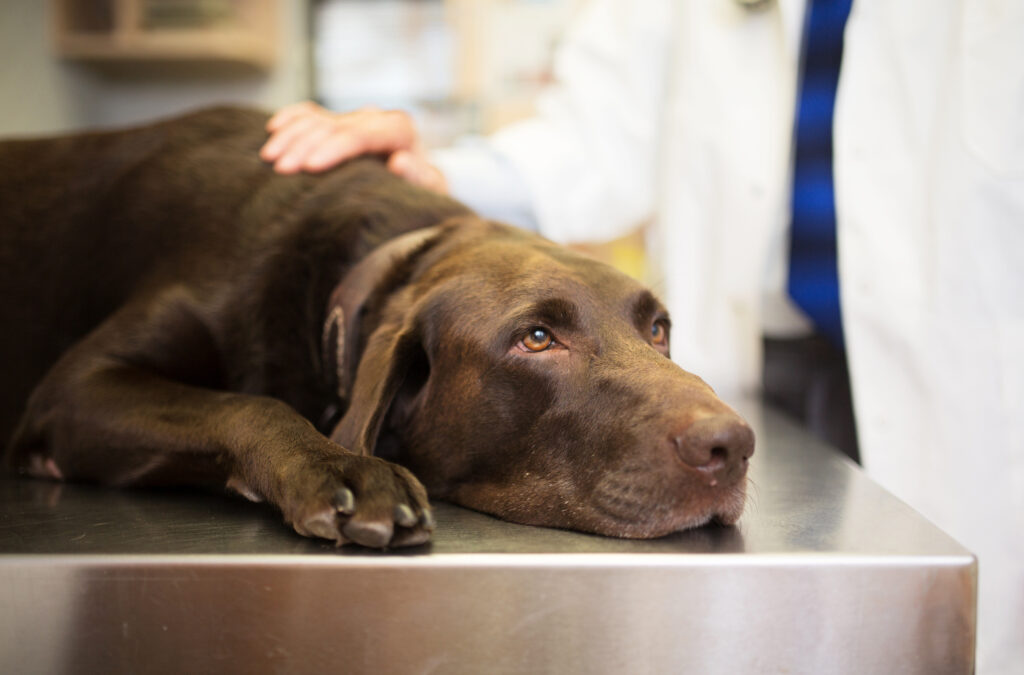
What Causes Digestive Problems in Dogs?
Digestive upset indicates that something is disrupting the delicate balance of your dog’s intestinal tract. While there are many potential causes, most issues stem from a few common culprits [1].
Food Allergies and Intolerances
True food allergies or sensitivities can cause chronic digestive upset. These can develop at any point in your dog’s life, even to a food they have eaten for years. Common triggers include proteins like beef or chicken, dairy, and wheat. Your veterinarian can help you identify the offending ingredient through a systematic elimination diet.
Dietary Indiscretion and Sudden Food Changes
Dogs are notorious for eating things they shouldn’t, from table scraps to treasures found in the trash. This “dietary indiscretion” can easily overwhelm their digestive system. Likewise, switching your dog’s food too quickly can throw their gut for a loop, causing temporary distress.
Stress and Anxiety
Just like in people, stress and anxiety can make a dog feel queasy. Stressful events like moving, a change in routine, or a visit to the vet can trigger a “fight-or-flight” response that slows down digestion and leads to an upset stomach.
Infections and Parasites
Bacterial or viral infections are common causes of short-term GI upset. Intestinal parasites like worms or protozoa can also interfere with your dog’s ability to absorb nutrients, leading to chronic diarrhea and other digestive problems.
What to Feed a Dog with a Sensitive Stomach
Choosing the right food is one of the most effective ways to manage digestive issues. The goal is to provide nutrition that is easy to digest, promotes a healthy gut, and meets all of your dog’s needs.
The Role of Specialized Dog Food
Specialized dog foods are formulated to address specific health needs, including sensitive stomachs. These diets are designed for optimal nutrient absorption and often feature:
- Highly Digestible Ingredients: Easily broken down and absorbed, putting less strain on the digestive system.
- Limited Ingredient Formulas: Contain fewer components to reduce the chance of triggering a food sensitivity.
- Prebiotics and Probiotics: These ingredients support a healthy gut microbiome. Prebiotics feed the good bacteria, while probiotics (live beneficial bacteria) help balance the intestinal environment [2].
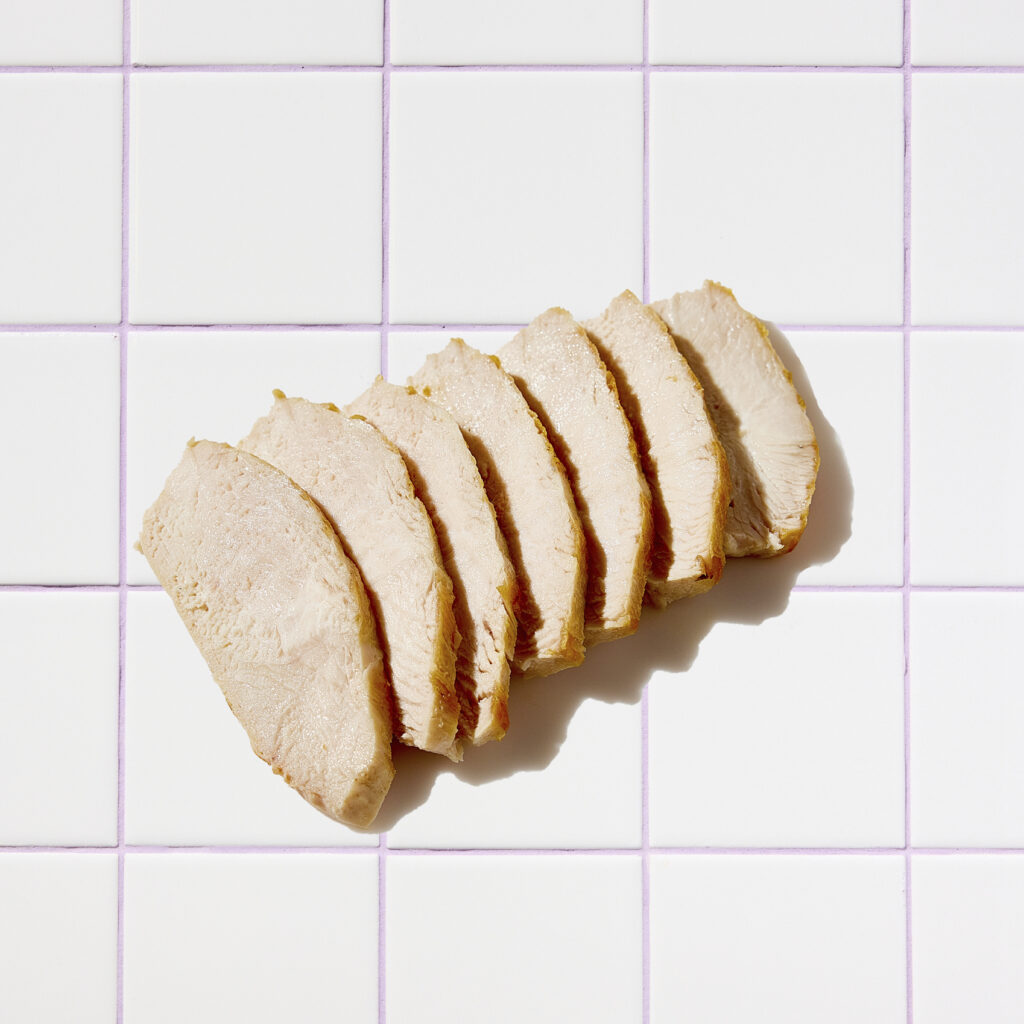
Key Ingredients to Look For
When reading labels, look for whole-food ingredients that are known to be gentle on a dog’s stomach.
- Lean, High-Quality Proteins: Easily digestible proteins like chicken and turkey provide essential amino acids without being too rich.
- Healthy Fiber Sources: Soluble and insoluble fiber from sources like pumpkin, sweet potatoes, and oatmeal can help regulate bowel movements and firm up loose stool [3].
- Moisture-Rich Foods: Fresh foods naturally contain more moisture, which aids digestion, improves nutrient absorption, and helps keep your dog hydrated.
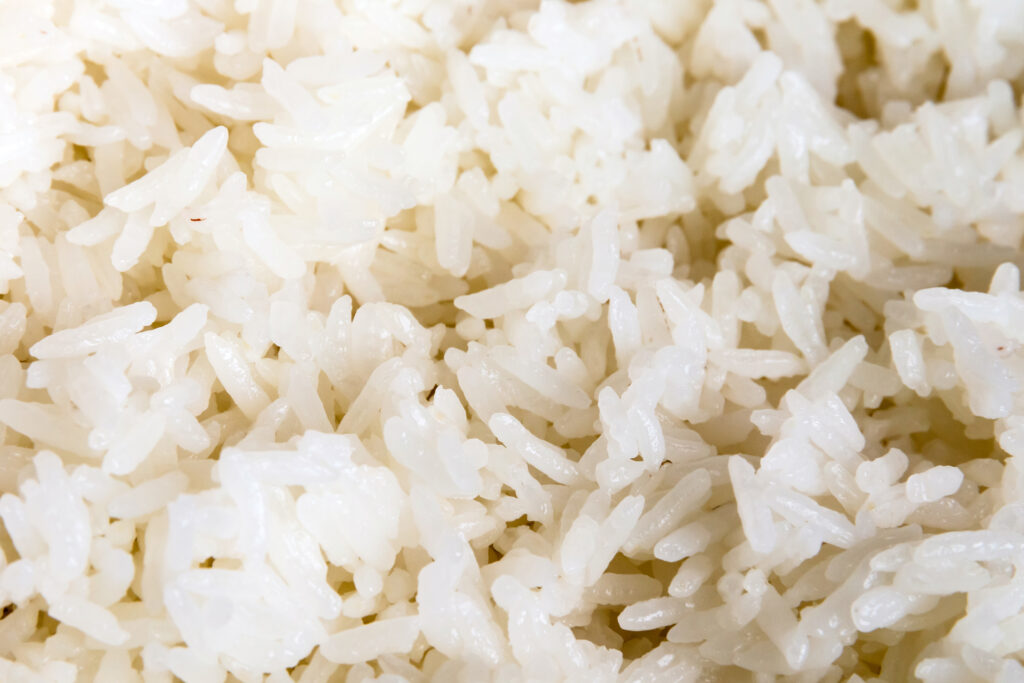
A Bland Diet for Temporary Upset
For occasional, mild digestive upset, your veterinarian may recommend a temporary bland diet. This simple meal can help soothe your pup’s stomach and give their GI tract a chance to rest. A bland diet typically includes:
- Boiled Lean Meat: Plain, boiled chicken or turkey with all fat removed.
- White Rice: Plain, steamed white rice is low in fiber and easy to digest.
- Pure Pumpkin: A small amount of pure pumpkin puree (not pie filling) can help firm up stool.
A bland diet is a short-term solution. If your dog’s symptoms don’t improve within a day or two, contact your veterinarian.
How to Safely Switch Your Dog’s Food
When you find a new food that you’re excited about, it can be tempting to make the switch immediately. However, a slow and steady transition is the best way to avoid causing more digestive upset. A gradual transition gives your dog’s gut microbiome time to adjust. Experts recommend a transition period of at least 7 to 10 days [4].
Follow this simple schedule:
- Days 1–3: Feed 75% old food mixed with 25% new food.
- Days 4–6: Feed 50% old food mixed with 50% new food.
- Days 7–10: Feed 25% old food mixed with 75% new food.
- Day 11+: Feed 100% new food.
Monitor your dog closely during the transition. If you notice any vomiting, diarrhea, or loss of appetite, slow down the process or take a step back.
Ready to see the difference the right food can make? Start fresh with Ollie.
Frequently Asked Questions
What are the best dog food ingredients for a sensitive stomach?
The best ingredients are highly digestible and gentle on the gut. Look for lean proteins (chicken, turkey), healthy fiber sources (pumpkin, sweet potato, oatmeal), and moisture-rich whole foods. Many specialized formulas also include prebiotics and probiotics to support a healthy gut microbiome [5].
Can I mix fresh dog food with kibble for my sensitive dog?
Yes, mixing fresh food with kibble can help boost your dog’s nutrition and improve digestibility. The added moisture and high-quality ingredients in fresh food may support a sensitive stomach. Just be sure to introduce the fresh food gradually to allow your dog’s system to adjust.
How quickly can a specialized diet improve my dog’s digestive issues?
Some pet parents see improvements within a few days, while for others, it may take a few weeks. Some therapeutic diets are clinically shown to firm up loose stool in as little as 24 hours [4]. Consistency is key, so stick with the new diet for at least a month to fully assess its benefits.
Is raw food a good option for dogs with sensitive stomachs?
Some proponents suggest that raw diets can be easier for some dogs to digest because they are minimally processed. However, raw diets carry a risk of bacterial contamination and may not be nutritionally balanced. It’s crucial to discuss this option with your veterinarian before transitioning your dog to a raw diet.
When should I see a vet for my dog’s digestive problems?
You should consult your veterinarian if your dog’s symptoms are severe, last for more than 48 hours, or are accompanied by other signs like lethargy, fever, or blood in the stool. Chronic, recurring digestive issues always warrant a veterinary visit to rule out underlying health conditions [1].
Citations
[1] https://www.royalcanin.com/us/dogs/health-and-wellbeing/your-dogs-diet-and-their-digestive-health
[2] https://www.purina.com/pro-plan/dogs
[4] https://www.hillspet.com/dog-food/pd-gastrointestinal-biome-canine-dry
[5] https://www.proplanvetdirect.com/canine-dry-en-gastroenteric
Tagged As:

The nutrition your dog needs,
the food they want.

Enjoying our articles? Subscribe our Newsletters and get new articles directly to your inbox
You might also like
29 September 2025
6 MINS READ
How Is Fresh Dog Food Made?
Unlike standard kibble that undergoes high-heat processing, fresh dog food maintains the natural integrity of ingredients while avoiding artificial additives and fillers. But what exactly goes int…
by Ollie Pets
29 September 2025
7 MINS READ
Is Lamb a Good Protein for Sensitive Stomachs?
Lamb provides significant nutritional benefits for dogs, particularly for pups with sensitive stomachs who need a specialized diet. This protein-rich meat offers an excellent alternative for pups …
by Ollie Pets
29 September 2025
7 MINS READ
Top 10 Fresh Ingredients for Your New Puppy’s Bowl
As dog parents, we naturally want to provide our pups with a strong start in life. This means giving them nutrition that is able to support their rapid growth, abundant energy, and developing immu…
by Ollie Pets





